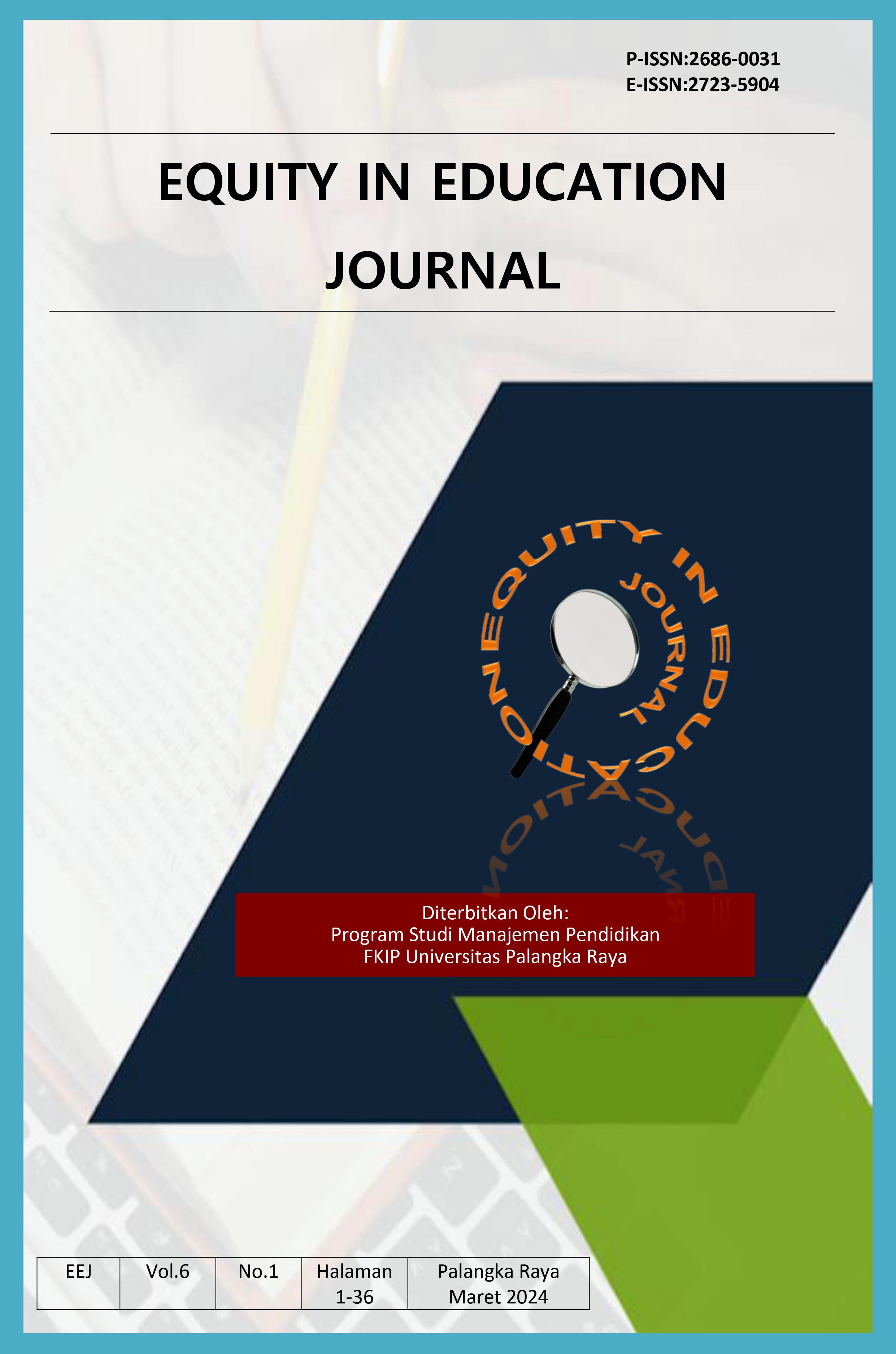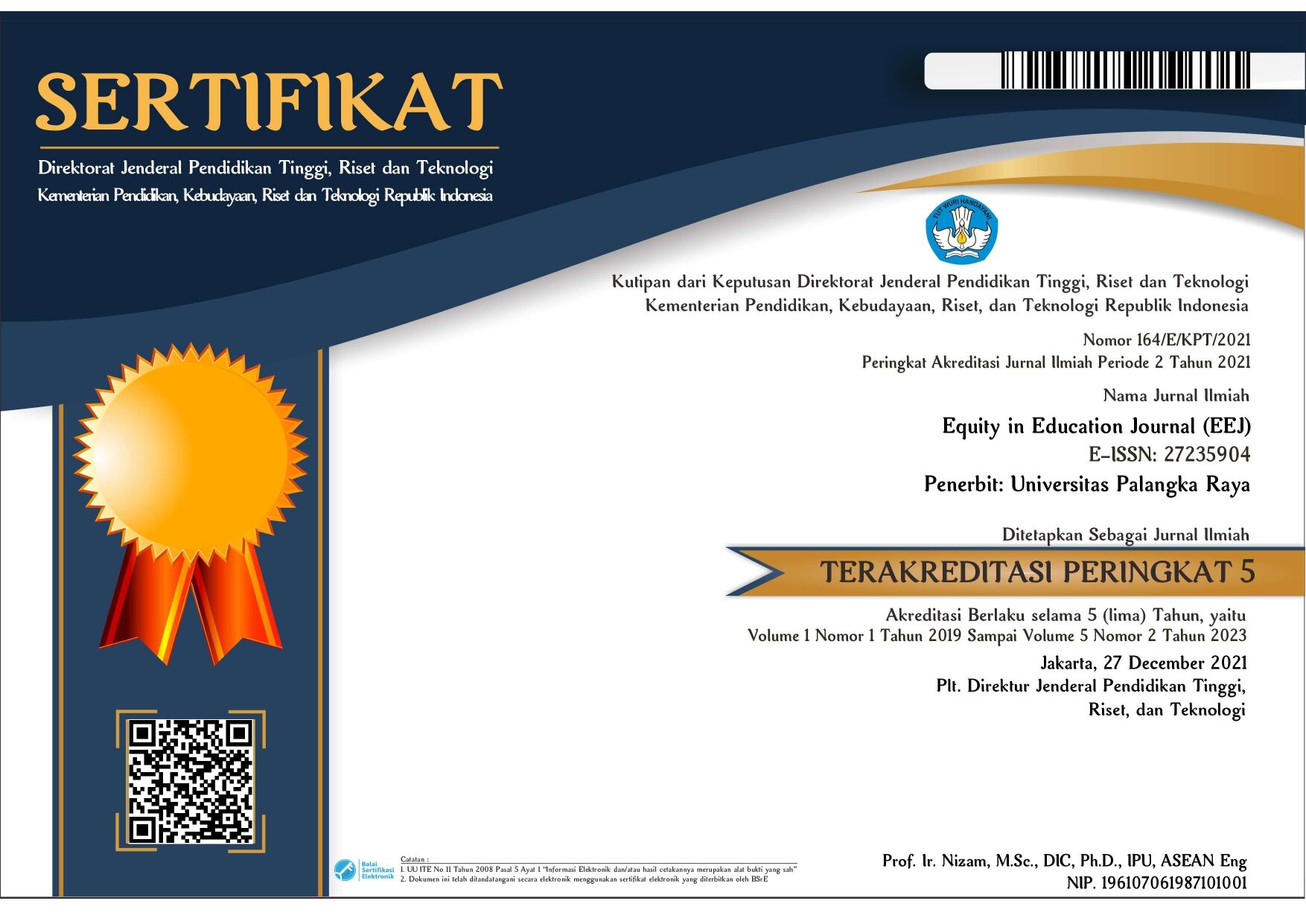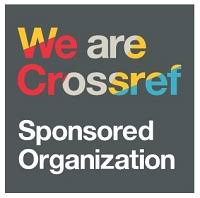KEPEMIMPINAN KEPALA SEKOLAH DALAM MENINGKATKAN KUALITAS PENDIDIKAN DI ERA REVOLUSI INDUSTRI 4.0
DOI:
https://doi.org/10.37304/eej.v6i1.12789Keywords:
Kepemimpinan, Kepala Sekolah, Kualitas Pendidikan, Revolusi Industri 4.0.Abstract
The aim of this research is to improve the leadership of school principals towards the effectiveness of driving schools in improving the quality of education in the era of industrial revolution 4.0. The research method used to write this article is a qualitative method with a literature review approach. for the development of high school schools in Rembang Regency. Of course, now that we are entering the era of the industrial revolution, the quality of schools must be improved with ideal leadership. Leadership of the industrial revolution 4.0. Leaders who follow technological developments must have the skills to influence, encourage, guide, direct and mobilize other people involved in organizing and developing education and teaching in the era of the industrial revolution 4.0. In other words, the success of a school in achieving its goals really depends on the leadership of the school principal who is able to use all the resources the school has effectively and efficiently. Driving schools change the new paradigm of student-centered learning which embodies the Pancasila student profile which includes competencies and character originating from superior human resources to improve the quality of education in the era of the industrial revolution 4.0.
Downloads
References
Alenezi, A. (2017). Technology Leadership in Saudi Schools. Education and Information Technologies, 22(3), 1121–1132. https://doi.org/10.1007/s10639-016-9477-x
Anipah., Yuniarsih, C., Susanti., Azis, A., & Septialona, A. (2023). Menganalisis Kompentensi Pemimpin Perubahan Di Era Perubahan Digital dan Implementasi Di Lembaga Pendidikan. Jurnal Syntax Admiration, 4(1). https://doi.org/10.46799/jsa.v4i1.528
Anizah, A., & Maretta, W. F. (2017). Kepemimpinan Efektif Kepala Sekolah Dalam Mengembangkan Profesionalisme Guru. JMKSP (Jurnal Manajemen, Kepemimpinan, Dan Supervisi Pendidikan), 2(1), 97–105. https://doi.org/10.31851/jmksp.v2i1.1157
Aprilana, E. R., Kristiawan, M., & Hafulyon. (2017). Kepemimpinan Kepala Madrasah dalam Mewujudkan Pembelajaran Efektif di Madrasah Ibtidaiyyah Rahmah El Yunusiyyah Diniyyah Puteri Padang Panjang. Elementary: Islamic Teacher Journal, 11(1). http://dx.doi.org/10.21043/elementary.v4i1.1975
Damsar. (2012). Pengantar Sosiologi Pendidikan. Jakarta: Kencana.
Fitrah, M. (2017). Peran Kepala Sekolah dalam Meningkatkan Mutu Pendidikan. Jurnal Penjaminan Mutu, 3(1), 31–42.
Gaspar, M., Julião, J., Cruz, M. (2019). Organizational Strategies Induced by the Fourth Industrial Revolution: Workforce Awareness and Realignment. In: Machado, J., Soares, F., Veiga, G. (eds) Innovation, Engineering and Entrepreneurship. HELIX 2018. Lecture Notes in Electrical Engineering, vol 505. Springer, Cham. https://doi.org/10.1007/978-3-319-91334-6_45
Hariyadi, A., Dumiyati., Tukiyo., & Darmuki, A. (2023). The Effectiveness of PBL Collaborated with PjBL on Students’ 4C in The Course of Basic Education. International Journal of Instruction, 16(3), 897-914. https://doi.org/10.29333/iji.2023.16348a
Hartina., Hariyadi, A., Tukiyo., Romadhianti, R., & Seena, I. (2022) Strengthening Charateristics of Organizational Structures as An Effort To Improve Madrasah Employee Parformance. Al-Tanzim: Jurnal Manajemen Pendidikan Islam, 6(3). https://doi.org/10.33650/al-tanzim.v6i3.3769
Ismail, F. (2018). Implementasi Total Quality Management (TQM) di Lembaga Pendidikan. Jurnal Ilmiah Iqra, 10(2). http://dx.doi.org/10.30984/jii.v10i2.591
Jannah, L. K. (2020). Kepemimpinan Kepala Sekolah dalam Menghadapi Era Revolusi Industri 4.0: Perspektif Manajemen Pendidikan. ISLAMIKA, 2(1), 129-139. https://doi.org/10.36088/islamika.v2i1.471
Miles, M. B., Huberman, A. M., & Saldana, J. (2014). Qualitative Data Analysis A Methods Sourcebook. United States of America: SAGE Publications Inc.
Moleong, L. J. (2012). Metodologi Penelitian Kualitatif. Bandung: PT. Remaja Rosdakarya.
Rahayuningsih, Y. S., & Iskandar, S. (2022). Kepemimpinan Kepala Sekolah dalam Menciptakan Budaya Sekolah yang Positif di Era Revolusi Industri 4.0. Jurnal Basicedu, 6(5), 7850–7857. https://doi.org/10.31004/basicedu.v6i5.3626
Sriwahyuni, E., Kristiawan, M., & Wachidi, W. (2019). Strategi Kepala Sekolah Dalam Mengimplementasikan Standar Nasional Pendidikan (SNP) Pada SMK Negeri 2 Bukittinggi. JMKSP (Jurnal Manajemen, Kepemimpinan, Dan Supervisi Pendidikan), 4(1), 21–33. https://doi.org/10.31851/jmksp.v4i1.2472
Sugiyono. (2019). Metode Penelitian Kuantitatif, Kualitatif dan R&D. Bandung: Alfabeta.
Sunarijah, S. (2018). Upaya Meningkatkan Mutu Sekolah Dasar Menghadapi Era Revolusi Industri 4.0. Ta'dibia: Jurnal Ilmiah Pendidikan Agama Islam, 8(2), 15- 26.
Yulisetyawati, A. A., Burhanuddin, B., & Zulkarnain, W. (2018). Efektivitas Kepemimpinan Kepala Sekolah dan Hubungannya dengan Kinerja Guru. Jurnal Administrasi Dan Manajemen Pendidikan, 1(1), 37-44. http://dx.doi.org/10.17977/um027v1i12018p37
Yusro, M. (2018, July 11-14). Strategi Peningkatan Mutu Akreditasi SMK Memasuki Era Revolusi Industri 4.0. Seminar Nasional APTEKINDO: Revitalization of Technical and Vocational Education to Face Industrial Revolution 4.0. Diterima dari http://repository.unp.ac.id/35820/1/BUDI_SYAHRI_Prosiding_Nasional_Aptekindo_2018_OK.pdf
Downloads
Published
How to Cite
Issue
Section
License
Copyright (c) 2024 Siti Aniqoh Shofwani, Pipit Sundari, Sarbullah, Yovita Mumpuni Hartarini, Ahmad Hariyadi.

This work is licensed under a Creative Commons Attribution 4.0 International License.










